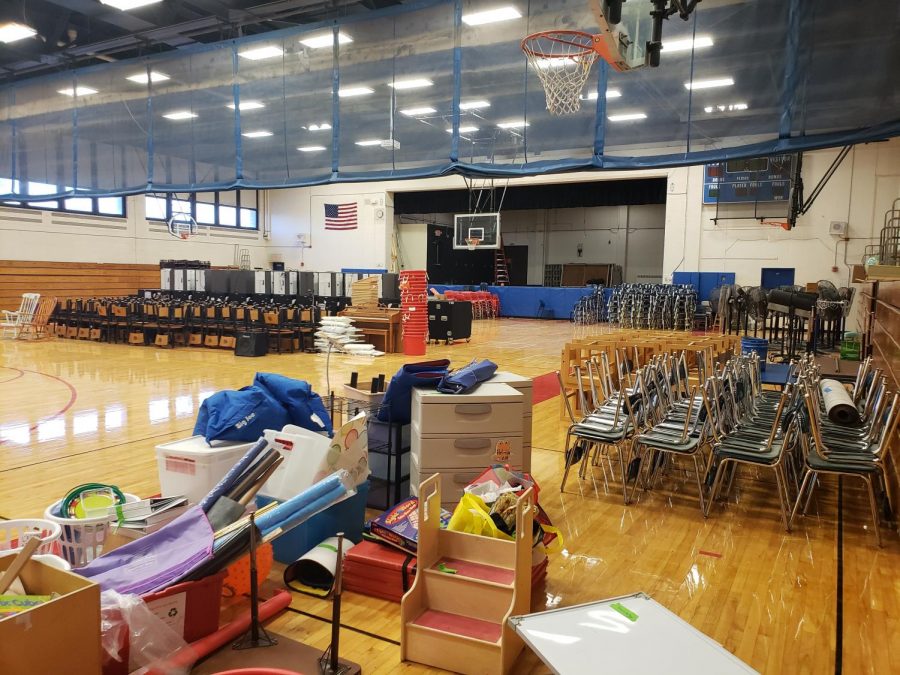District 95’s resale and recycling
Administration to reutilize items one last time
“I like it when we are able to find value in things that are no longer being used,” Phil Howard, District 95’s director of technology, said. “Finding value — especially monetary value — in outdated materials is important to District 95.”
According to Terese Cowell, business office coordinator of District 95, all of the money District 95 receives from vendors for the resale of electronic equippment gets “put in the technology department’s budget so that they can purchase new equipment for schools and students.”
“Whether it’s resale or finding another school that’s able to actually use it, there’s a lot of satisfaction in taking things that are old and making them useful again,” Howard said.
Finding a different place for the used items in District 95 is a job of three key individuals: Terese Cowell, business office coordinator for District 95; Lyle Erstad, the district’s director of facilities and grounds; and Howard.
This year, the district sold 2,138 pieces of Apple technology and used HP computers to vendors, earning approximately $243,740 that helps to offset large expenditures.

Technology
“We have a lifespan for every electronic device here. Whether that’s the hotspots in the ceiling for the wireless network or our switches on the back end, they all have kind of a life cycle. And then once they’ve outlived their life cycle for us, if they have value, still, we actually sell them. If they no longer have value, we work with an authorized electronics recycling company, who then is able to come and pick it up,” Howard said. “But if [anything] has got a cord [or] a circuit board, it gets recycled. Nothing is ever put in the trash.”
According to Cowell, the reselling process must adhere to “specific laws,” and takes at least 2 to 3 months to carry out.
“We put together a document that gives that criteria to the various vendors that we work with,” Cowell said. “[What is] usually included [in the document] is a list of the equipment that we have, [and] depending on where the equipment is located and the time of year, sometimes we allow the potential buyers to come and inspect the equipment. But, that hasn’t been able to happen last year [because] of COVID.”
In order to ensure the buyer’s legitimacy and reveive the best selling price, the district follows a carefully planned out procedure when making deals with outside partners.
“We require 100% payments before [our partners] can come and pick up the equipment. [The payment is] in the form of a cashier’s check,” Cowell said. “The most difficult part is compiling the list of what we have available with the information that the buyers are going to want. Such as condition, serial number, capacity, like gigabyte capacity. All of those different situations garner a different price. Generally, we don’t sell anything other than electronic equipment. Any type of furniture or other pieces of equipment that we have in the district either gets donated somewhere, or sometimes facilities will sell some [used items] for the scrap value of the metal.”
According to Consumer News and Business Channel (CNBC), copper has reached its highest price in the last decade. Prices of copper have increased 21% this year due to the high demand, making any collected materials with metals more valuable to the recycling companies.
Any electronic equipment that does get recycled, like an “entire school’s worth of projectors” according to Howard, is taken by recycling companies for their own advantage.
“So things like old VCRs, old projectors, and old audio-visual equipment, [are] all put into a bin. Once we get, say, four, or five, six, or maybe eight bins, stored in a single location, we call a recycling company and they’ll come pick it up. Because they see value in it, [recycling companies] actually do that pickup for free,” Howard said.
However, according to Howard, not everything is picked up by recycling comapnies for free.
“We don’t have to pay to get rid of the electronics recycling, with one exception, and that is TVs,” Howard said. “Every time we get rid of a tube TV, (a box-like TV with hard glass that originated in the 1930s), we actually have to pay to have that recycled. When they recycle it, they ecologically dismantle it. They take care of all of the toxic chemicals that are inside because some of that older technology was made with a lot of lead. That takes time and effort to remediate.”
Furniture and Curricula
Technology is just one aspect of the recycling program in the district. Lyle Erstad, Director of Facilities and Grounds, described how much of the new construction that occurred in the past year across the district caused items like furniture and old curriculum to be no longer needed by schools.
“As we’re cleaning out May Whitney, [there] is curriculum that is too dated. Now, there are certain pieces of curriculum that are still worthwhile. The [old curriculum] is sent to the curriculum and instruction department. [They] go back to the publisher. [The publisher] then buys back, in some cases, some of the old materials,” Erstad said.
According to Erstad, if the currciulum is not resold in the district, it can also be recycled by partnering with other organizations.
“For instance, we’re having a company called Discover Books come and pick up close to 300 boxes of books. Now, these have not just been from a Whitney, they’ve been collected from around the district. [What] they will do is either [they will] turn [the books] into money, or they will recycle them. Because hardbound books have to be recycled in a particular way, they can’t just be recycled. We want to make it as as as minimal as possible.”
Global Donations
Instead of disposing items that cannot be sold but are in nice condition, Erstad says, the district makes an effort to gift materials to countries that are in need of items no longer needed by schools.
“Those chalkboards that we took down from Isaac Fox [are] perfectly good writing surfaces. But no school in America at this point in time [needs them]. There are third-world countries that are begging for that kind of material. We work with a couple of different organizations,” Erstad said.
Erstad mentioned how the district’s practice aligns with his own philosophy that is grounded in his life growing up on a farm.
“If you don’t take care of the land, the land won’t take care of you. We have a stewardship responsibility to be able to care for this earth. I view my efforts and recycling, and I know that others do as well, as the key to being good stewards of what we have been entrusted with. I tried to focus on, whether it’s purchasing brand new items or whether it’s disposing of [something] old, on how somebody’s taxpayer dollars paid for this and I have to be fiscally responsible,” Erstad said. “Secondly, I remind myself on a regular basis, ‘this was not yours to begin with.’ Some things do end up in the waste stream. There’s no way to get around that. But are we doing it in the right manner? Are we doing it in a way that is good for the earth as much as we possibly can?”

This is Jane’s third year on staff and second year as Digital Editor-in-Chief of Bear Facts. Jane is involved in orchestra, Tri-M, NHS, Sinfonietta,...

